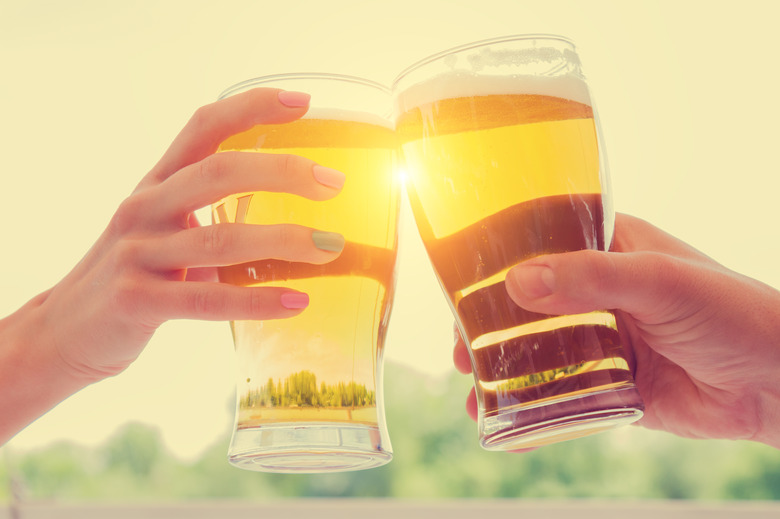Bottoms Up: Drinking Beer Can Increase Creativity
The next time writer's block hits or artistic inspiration lags, consider a beer or two or a glass of wine to get the creative juices flowing. Dr. Mathias Benedek, assistant professor of the Institute of Psychology at the University of Graz in Austria, and lead author of a recent study on the subject, found that moderate alcohol use can increase creativity.
Women vs. Men
Women vs. Men
Dr. Benedek and his co-authors "examined the effect of alcohol on executive control and on standard measures of creative cognition," in their 2017 study published in the scientific journal "Consciousness and Cognition." The study tested 70 people, 54 percent of whom were female, with ages between 19 and 32. The study showed that men and women performed pretty much the same.
Bottles of Beer on the Wall
Bottles of Beer on the Wall
The scientists used beer for the study because it was a common university drink and available in both alcoholic and nonalcoholic forms. The alcohol-drinking group consumed a naturally brewed Austrian beer, Gösser Zwickl (5.2 percent alcohol by volume), while the placebo-group drank Gösser Naturgold (containing less than 0.5 percent alcohol by volume) by the same brewery. Both beers were similar in color and taste, and wine was not included in the study.
The scientists adjusted the amount of beer consumed by weight, gender and age, to be fair in the results. For example, 22-year-old males weighing approximately 165 pounds and standing nearly 6 feet tall consumed just over 16 ounces of beer. Women of the same age, about 5 feet, 5 inches tall weighing about 143 pounds drank nearly 12 ounces. Participants were asked to refrain from drugs, or alcohol 24 hours before the study and could not drink caffeinated beverages at least two hours before the study. All participants were tested for sobriety before the study began.
Word Association
Word Association
The total experiment took about two hours to complete with participants being tested for executive and creative functions before and after the test. Each participant self-graded their intoxication level, and it was only after the test that certain participants found out they were only drinking nonalcoholic beer.
The study noted that both groups both felt slightly intoxicated after the test, but those who drank alcoholic beer showed a marked improvement in the Remote Associates Test (RAT), a measure of creativity. RAT determines creativity by requiring the participant to find the one word that links three dissimilar words together such as:
1. Sage – paint – hair: brush
2. French – car – shoe: horn
3. Chamber – mask – natural: gas
4. Main – sweeper – light: street
TL;DR (Too Long; Didn't Read)
Visit the link in Resources to test your own creativity before and after a beer or two to note if there is a difference.
Executive and Creative Functions
Executive and Creative Functions
The study showed that moderate alcohol use impaired executive brain functions – the mental skills needed to get things done and manage time effectively – while improving creativity and word association. Insignificant results were noted for thinking "outside the box," known as divergent thinking in the neurosciences.
Creative Problem Solving
Creative Problem Solving
Sian Beilock Ph.D., of "Psychology Today" reports that alcohol's effect on working memory – the mental prowess that aids us in deciding what to keep in mind and what to let go of – reduces the ability to focus on certain functions and ignore others. This directly benefits innovative problem solving. She implies the more you know about a subject, the harder it is to think creatively. Alcohol helps by blocking some of the items you may know, while allowing you to access the more creative aspects of the brain.
A similar study to the one conducted in Graz, Austria was completed at the University of Illinois at Chicago by psychologist Jennifer Wiley prior to the 2012 "Psychology Today" article. That study got test subjects drunk to an alcohol level of 0.075 percent by giving them vodka and cranberry drinks, while keeping other participants sober.
Social drinkers ages 21 to 30 were recruited for the Illinois University study via Craigslist, and who participated in the RAT assessment just like students did at the University of Graz study. The results were similar. The inebriated participants solved the same three-word with the fourth associated word quicker than those who were sober.
Too Much Alcohol
Too Much Alcohol
Each person must know their own limits when it comes to drinking too much alcohol. Brain functions that require cognitive control and executive functions – tasks that require analytical thinking – are much easier when the body is not inundated with alcohol. But creative thinking processes and inventive problem solving often benefit from a beer or two, as the alcohol consumption tends to block executive functions and allow inspiration to flourish.
Cite This Article
MLA
Brenner, Laurie. "Bottoms Up: Drinking Beer Can Increase Creativity" sciencing.com, https://www.sciencing.com/bottoms-up-drinking-beer-can-increase-creativity-13559035/. 22 September 2017.
APA
Brenner, Laurie. (2017, September 22). Bottoms Up: Drinking Beer Can Increase Creativity. sciencing.com. Retrieved from https://www.sciencing.com/bottoms-up-drinking-beer-can-increase-creativity-13559035/
Chicago
Brenner, Laurie. Bottoms Up: Drinking Beer Can Increase Creativity last modified March 24, 2022. https://www.sciencing.com/bottoms-up-drinking-beer-can-increase-creativity-13559035/
